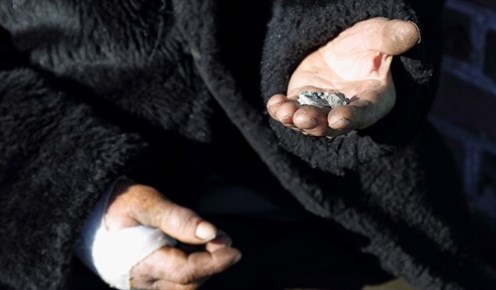19 March 2015
Cluster Munitions Used by Both Sides in Ukraine
Civilian victims include two children

Ivan Fedorovich, 83, holds fragments that wounded him in his hand and stomach during a cluster munition attack on Hrodivka on February 10. © 2015 Human Rights Watch
Ukraine Government forces and Russian-backed rebel forces used cluster munitions in the east of Ukraine in January and February 2015, according to in-depth research by Human Rights Watch made public on 19 March 2015. At least 13 civilians were killed, including two children.
"Ukraine and Russia both publicly condemned in recent months the use of cluster munitions in populated areas," said Megan Burke, Director of the Cluster Munition Coalition. "Now, it has become appallingly clear that both sides have used the weapon, directly putting the lives of innocent civilians at risk."
The Cluster Munition Coalition calls upon Ukraine and Russia to conduct investigations and to publicly renounce the use of the weapon by joining the Convention on Cluster Munitions.
On 10 February 2015, Ukrainian President Petro Poroshenko said: "It is savages who use cluster munitions against civilians."
In October 2014 Russian Foreign Ministry Spokesman Alexander Lukashevich called the use of cluster munitions "barbaric" and said that the "use of cluster munitions in populated areas violates international humanitarian law and may constitute war crimes".
Cluster munitions are banned under the 2008 Convention on Cluster Munitions, on the basis of the disproportionate and indiscriminate harm they cause both at the time of attack and over the longer term. Strikes have a large footprint and leave behind duds that remain a fatal threat to anyone in the area long after use. Any use, including outside populated area, is banned under the Convention.
Extensive use of cluster munitions in Ukraine had already been reported in October 2014. Since then, at least 52 states have condemned the use of cluster munitions in Ukraine, of which 27 have made direct national statements, and the others associated themselves with an EU statement expressing concern about use in Ukraine.
In September 2014, States Parties to the Convention on Cluster Munitions unanimously condemned any use of the weapon, by anyone, under any circumstances. In addition, at least 157 states have condemned the use of cluster munitions in the context of ongoing use in Syria, demonstrating the strong stigma associated with the weapon.
More information on instances of use in 2014 and related condemnations is available on the summary page Cluster Munition Use in Ukraine.
Cluster Munition Coalition calls:
- Both sides should initiate independent investigations and make findings public
- All parties to the conflict in Ukraine should renounce the use of cluster munitions, an internationally banned weapon
- Both Ukraine and Russia should accede to the Convention on Cluster Munitions
- Cluster munition stockpiles should be declared and destroyed
- Cluster munition remnants must be cleared and destroyed as soon as it is safe to do so and international support given to enable clearance efforts
- Through risk education, clear warnings must be given to communities about the terrible danger unexploded bomblets pose
- The victims of cluster munitions and other explosive weapons must be supported
- Governments worldwide should continue to condemn use of cluster munitions in Ukraine and call for all states to join the Convention on Cluster Munitions


